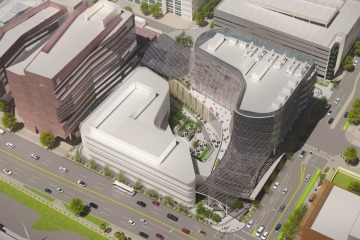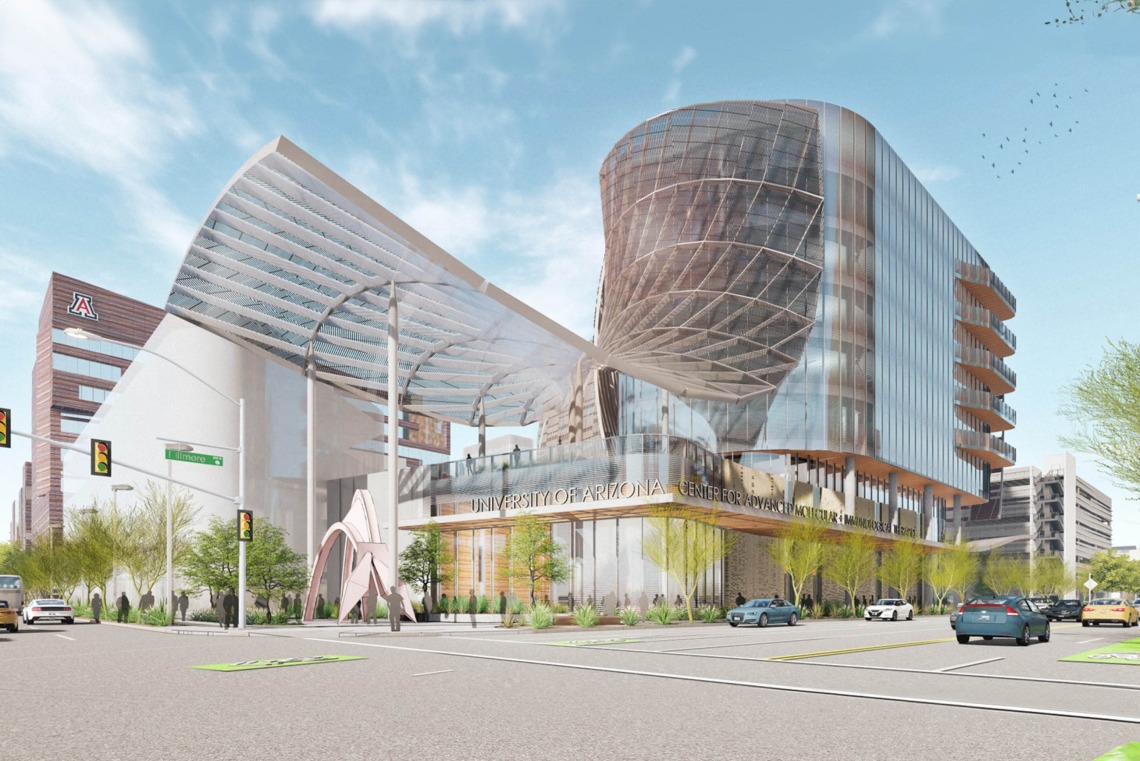The University of Arizona Health Sciences announced December 12 it had selected McCarthy + SmithGroup to lead the design and construction of the Center for Advanced Molecular and Immunological Therapies, or CAMI, facility in downtown Phoenix.
Both McCarthy Building Companies, Inc. and SmithGroup are nationally recognized Phoenix-based firms with unique expertise in designing and building educational and research facilities. Other projects completed by the respective firms include UArizona’s recently opened Applied Research Building in Tucson and the Translational Genomics Research Institute’s headquarters, which opened in 2005 on the Phoenix Bioscience Core, where CAMI also will be located, according to an announcement from the University of Arizona.
“The design-build team model presented by McCarthy + SmithGroup creates a synergy that provides efficiencies in both time and resources for CAMI,” said Ken Knox, MD, chair of the CAMI Advisory Council’s Space, Design and Construction Committee. “The team has a proven track record of working together and an enormous portfolio of laboratory design experience, which is what the committee was looking for in design and construction firms.”
The CAMI building is anticipated to be seven stories tall with more than 200,000 square feet of laboratory, administrative and seminar space. The laboratory space will accommodate up to 40 principal investigator-led research groups and include labs suitable for bioengineering research.
“We are committed to using our collaborative and creative partnership to unlock the potential of the site, establish connections, foster future flexibility and growth, incorporate inherent sustainability, and design and execute a memorable plan to bring CAMI to life,” said Lloyd Flowers, design-build director for McCarthy. “CAMI will stand as the iconic research building in downtown Phoenix, exemplifying how physical space can transform the exploratory spirit of science, from research to deployment.”

“The project’s unique, high-profile urban site creates a monumental design opportunity that will become the gateway into downtown Phoenix, with a stunning architecture that is both one of a kind and reflective of its unique urban desert setting,” said Mark Kranz, design director for SmithGroup.
November 2024 is the anticipated groundbreaking date for the new building, which will be operational by mid 2027, though CAMI research may begin sooner than that. The second floor of the Biomedical Sciences Partnership Building at 475 N. Fifth Street is currently being built out to house laboratory and administrative space for CAMI, with construction scheduled to be completed in May 2024.
“The steering committee gave a lot of thought to the fact that CAMI sits on a very visible corner in the heart of downtown Phoenix,” said Knox, who is a professor and the vice dean of academic and faculty affairs at the UArizona College of Medicine – Phoenix. “A big factor for us was making sure we selected a design-build team that understood we have a collaborative spirit and want to make CAMI an inviting place to engage the community.”
CAMI’s location at the corner of East Fillmore Street and Seventh Street in downtown Phoenix is expected to facilitate strong connections with partners such as Arizona State University, Northern Arizona University, the Mayo Clinic and the Translational Genomics Research Institute, while boosting the local economy in the process.
The center will serve as the anchor for an innovation district that aims to differentiate Phoenix from other emerging life sciences hubs, establishing the Phoenix Bioscience Core as a hub of cellular and gene therapy research, startup activity and corporate engagement.
CAMI will advance precision medicine in four areas: cancer, infectious diseases, autoimmune conditions and real-time immune monitoring and profiling. The center builds on the idea that the most effective defense against health issues is the body’s natural immune system.
“There is not a field with more explosive growth than immunotherapy. There is rapid growth in research investment and increased formation of academic and industry partnerships around the world,” said Michael D. Dake, MD, senior vice president for the University of Arizona Health Sciences. “CAMI will be a beacon for people who are involved in this type of work to collaborate and engage on the Phoenix Bioscience Core. My hope is that CAMI will accelerate the development and delivery of revolutionary treatments for the management of cancer, autoimmune and infectious diseases.”

